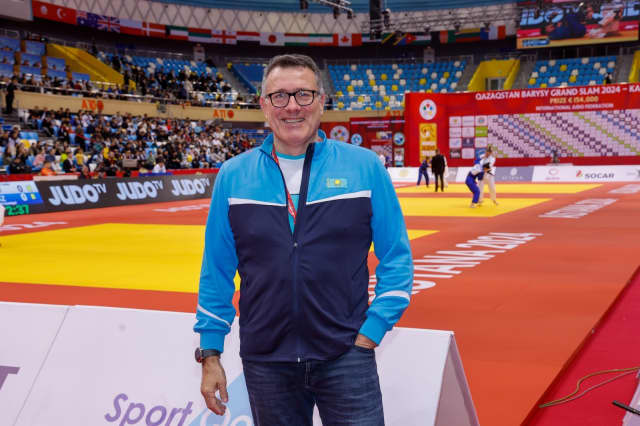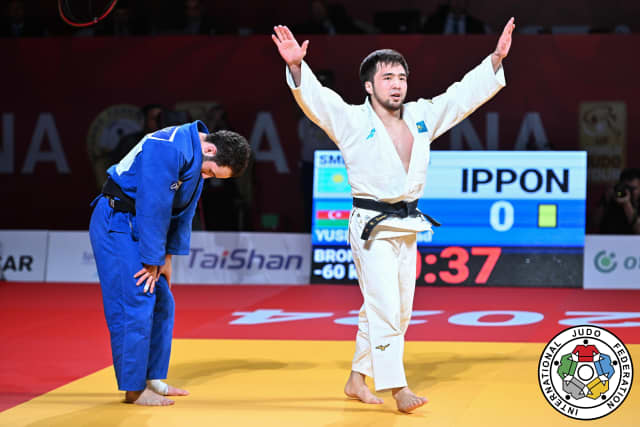
Stephane Traineau has been the Performance Director for the Kazakh national team for almost two years; it’s a long way from Paris!
“The General Secretary of the Kazakhstan Judo Federation spoke to me, some time ago now, about a new project in Kazakhstan and he invited me to visit Astana and Almaty for a few days. I took some time to think about the project but eventually I came back to them with some ideas, my vision of the task and as the federation accepted my ideas, I accepted the role.
Honestly, after this last two years it is still difficult to understand everything. I live in Almaty but in fact we are always moving, from domestic to international training camps and of course to competitions. I speak French, English, German and Spanish but not Kazakh or Russian and so to improve communications further, at the beginning of this year I asked for a translator. Now I can give deeper advice and not be superficial; it’s a more meaningful way to work. This has changed a lot of our working practices; I can now speak with everyone.
One difference since I took up this role is that now we train more, it’s simple but it’s true. We attend more international camps now too. With such a busy calendar, I have to help them train every day with the best athletes, for them to progress. It’s a contact sport and we transmit information through touch and practice. The more contact the athletes have with high level athletes from around the world, the more they will find that level themselves. The progress of the international scene, with the camps and opportunities to compete, has been fast in recent years. Kazakhstan was a little late to join this movement, in some ways."
"Now we try to do a minimum of one camp in Japan every year and stay for most camps after the international events. We also mix the training across our cadets, juniors, men and women. Now we also have the mixed team event for the Olympic Games to aim at and so it was necessary to move away from only separate training between the age categories and genders. Transmission of information and positive feelings between all groups is important. In my way I say that we have to break the walls between athletes. We have to help the most talented athletes to break through to the next level too, taking juniors to the high level, to stretch them and broaden their experience. I did the same in France with Maret, Pavia and others.
I try to change the mentality slowly. First, it’s a huge country and if you don’t understand this you miss something. Communication can be hard, not just with language but logistically. Athletes have to travel in planes and on trains to reach training. There are 20 regions, a country 6 times bigger than France. It’s also a country with some nomad culture. Culture is important as is the existing sport system and the relationship with both the nation’s government and local regional governments; all of this must be considered. There is no comparison between France and Kazakhstan, this is another world. I said to them that in the end we have to fight alongside the international judo system and know what is good for everyone, not staying just inside your own system, in our own country. I asked them to be open, much more open. I was happy that my ideas were accepted. I have been received very well in Kazakhstan since the beginning. I found a lot of kindness here. The distance here is difficult but the life and the role are great. I like it here.
In Kazakhstan you have some big medallists but no Olympic champion and it’s a really big goal for the country. I look at Tokyo 3 years ago and see 9 gold medals for Japan and only 5 for the rest of the world. We must still try and meet this big goal. They must also accept to change in some ways, not too fast, but accept to be open, and they do. I think it’s possible that we can have our first gold in Los Angeles. If everyone follows the simple rules of training every day, keeping open minded, staying focused on judo and not the score, it’s possible.
In Kazakhstan we have a lot of potential but I say that they must not think about training for two weeks and then winning. No, it takes time, it takes years. One athlete is also not the same as the next and we have to understand the process for each and the speed of improvement. Each must do their best with what they have. Also, we cannot only focus on results. Ivan Lendl, the great tennis player said, ‘If you want to win, don’t look at the scoreboard, look at the ball.’
This home grand slam is a big motivation and the athletes all want to be selected for this event. Yeldos Smetov said he loves the crowd and that is also why he loves Paris. The Kazakh people have that warm spirit that we also find in the Mediterranean. They enjoy this positive energy.
I will say that for this whole period I have spent a lot of time thinking. This is a very interesting part of my life. For however many years I’m here, it will continue to change me. Now, everyday I wake up and I have to open my mind and think differently. I have my history and my vision and it’s good but I have to adapt always and adjust to work with the Kazakh system and culture. Every day it is a challenge, an intellectual challenge. It moves me. Each time I travel back to France, again my vision of France, of my country, changes, even my vision of the world. I will never be the same again and for this alone I can say thank to Kazakhstan.”




